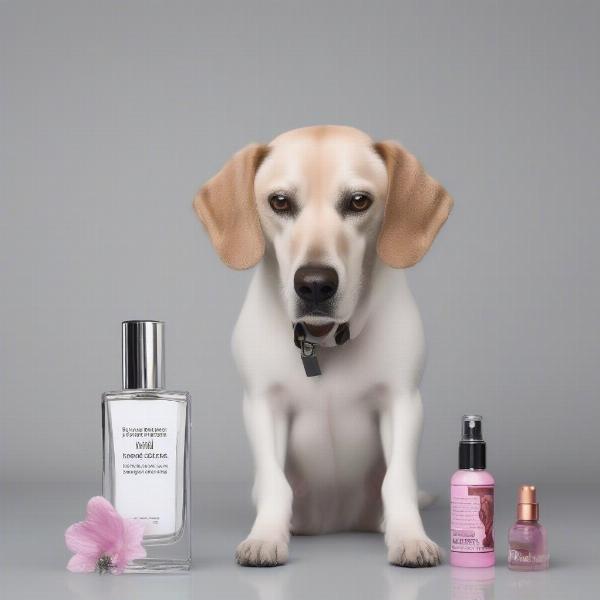Perfuming your furry friend might seem like a harmless way to keep them smelling fresh, but can i spray perfume on my dog? The short answer is: probably not. While the idea of a sweet-smelling pup is appealing, human perfumes, colognes, and even many “dog perfumes” can contain ingredients that are harmful to your canine companion. Let’s explore why it’s generally best to avoid spraying perfume on your dog and what alternatives exist to keep your dog smelling clean and pleasant.
Why Human Perfume is a No-No for Dogs
Dogs experience the world through their incredibly sensitive noses. What might be a pleasant scent to us can be overpowering and even irritating to a dog’s olfactory system. Many human perfumes contain chemicals, such as phthalates, essential oils, and alcohol, that can trigger allergic reactions in dogs. These reactions can manifest in various ways, including skin irritation, sneezing, watery eyes, and even difficulty breathing.
 Human Perfume Harmful to Dogs
Human Perfume Harmful to Dogs
Furthermore, dogs tend to lick themselves, and if they’ve been sprayed with perfume, they’ll ingest those potentially harmful chemicals. This can lead to gastrointestinal upset, vomiting, and diarrhea. In severe cases, ingestion of certain perfume ingredients can even cause neurological problems.
The Risks of “Dog Perfumes”
While marketed specifically for dogs, many commercially available “dog perfumes” also contain ingredients that can be irritating or even toxic. Artificial fragrances, even those labeled as “natural,” can still pose a risk. It’s crucial to carefully scrutinize the ingredient list of any dog perfume before using it on your pet.
Safe Alternatives for a Fresh-Smelling Dog
Keeping your dog smelling clean and fresh doesn’t require resorting to potentially harmful perfumes. Regular bathing with a dog-specific shampoo is the best way to remove dirt and odor. Opt for hypoallergenic, fragrance-free shampoos, especially if your dog has sensitive skin. best dog fragrance
Between baths, you can use dog wipes or dry shampoo specifically designed for dogs to freshen them up. Look for products with natural ingredients and avoid those with artificial fragrances.
How to Address Underlying Odor Issues
If your dog has a persistent unpleasant odor, it could indicate an underlying health issue. Skin infections, ear infections, dental problems, and anal gland issues can all contribute to bad smells. If you’re concerned about your dog’s odor, it’s essential to consult with your veterinarian to rule out any medical conditions.
Conclusion
While the temptation to spritz your dog with perfume might be strong, it’s crucial to prioritize their health and well-being. Avoid human perfumes and carefully evaluate the ingredients of any dog-specific fragrances. Regular bathing, dog wipes, and addressing any underlying health issues are the safest and most effective ways to keep your canine companion smelling clean and pleasant. Remember, a healthy dog is a happy dog, and their sensitive noses will thank you for choosing safe and gentle alternatives to perfume.
FAQ
- Can I use essential oils on my dog? While some essential oils are safe for dogs when used correctly, many are toxic and can cause serious health problems. It’s best to avoid using essential oils on your dog unless under the guidance of a veterinarian who is also knowledgeable about essential oil use in animals.
- My dog rolled in something smelly. What can I do? A good bath with dog shampoo is the most effective way to remove unpleasant odors.
- How often should I bathe my dog? The frequency of bathing depends on your dog’s breed, lifestyle, and coat type. Generally, bathing every 4-8 weeks is sufficient. Over-bathing can strip the natural oils from their skin, leading to dryness and irritation.
- What are some signs of a skin infection in dogs? Signs of a skin infection can include redness, itching, hair loss, scabs, and a foul odor.
- How can I keep my dog’s ears clean? Use a dog-specific ear cleaning solution and cotton balls to gently clean the outer part of your dog’s ears. Never insert anything into the ear canal.
- Why does my dog’s breath smell bad? Bad breath can be a sign of dental disease. Regular brushing, dental chews, and professional cleanings can help maintain good oral hygiene.
- What should I do if my dog has persistent bad odor? Consult with your veterinarian to rule out any underlying medical conditions.
ILM Dog is your trusted international resource for expert advice on all aspects of dog care and wellbeing. From breed selection to senior dog care, we offer practical, reliable information to help you provide the best possible care for your canine companion. Whether you’re a seasoned dog owner or just starting your journey, we have the resources you need. For tailored guidance on dog health, nutrition, training, grooming, and more, contact our expert team today! Email: [email protected] Phone: +44 20-3965-8624 Visit ILM Dog for more valuable insights and expert advice.